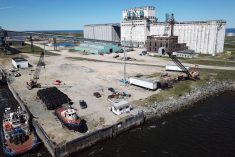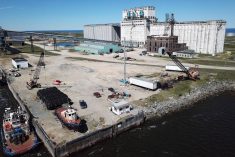The recent railway labour disruption at Canadian Pacific Railways starkly underlines the transportation-related vulnerability of Canada’s agriculture sector, industry watchers say.
An online seminar organized by the Canadian Agri-Food Policy Institute (CAPI) heard March 28 that fertilizer shipments in and out of the country are balanced on a knife edge, and Canada’s global reputation as a reliable supplier of quality grain is suffering.
“Right now, frankly, our reputation is very bad with our customers,” said Wade Sobkowich of the Western Grain Elevator Association.
Read Also

Students push for Manitoba road upgrades
Manitoba’s lack of higher-rated RTAC roads creates irritating highway detours and weight restrictions for farmers, University of Manitoba students told KAP.
Sobkowich said that many events of the past year — flooding, fires and a COVID-ravaged workforce for example — were outside the control of railways. But that makes it even more important to address issues that are controllable, such as the predictable labour unrest that affects shippers across the country, he added.
Karen Proud, CEO of Fertilizer Canada, echoed many of Sobkowich’s sentiments, especially the theme that labour unrest is an ongoing issue for shippers that predictably occurs.
“It seems like labour issues happen every year,” Proud said. “We need to ensure the movement of essential products — like agricultural products. We need solutions that don’t wind up with these disruptions.”
Proud said the global fertilizer shortage is a prime example of why the government should take action to prevent work stoppages.
When the Ukraine-Russia war began, and sanctions were put in place, her members were already scrambling to get their supplies into the country in time for seeding this spring.
“Then the CP lockout happened,” Proud said. “That’s of extreme concern.”
Canada’s outflow of fertilizer was also hampered, particularly in the potash sector, in which Canada is the world’s largest producer and exporter. The mines have a limited storage capacity and rely on good rail service to remain operational.
“We were about two hours away from shutting down a potash mine when we heard the strike had ended,” Proud said. “That would have been a significant issue not just for Canada but for the rest of the world.
“We don’t have huge storage capacity. The agreement we have with the railways is ‘we make it, you ship it.’”
Possible solutions
Sobkowich said the WGEA’s official position is that railways should be deemed an essential service and labour disputes in the sector should be subject to binding arbitration.
That’s necessary, he said, because of the unique nature of the railway sector, especially in Western Canada. There are two distinct railway networks with little geographic overlap, which makes each of them a functional monopoly in their operational areas, he noted.
“If you’re operating an elevator in the ‘middle of nowhere’ in Saskatchewan, on a CP track, you’re not beholden to a duopoly, you’re beholden to a monopoly,” Sobkowich said. “We would love to have a duopoly, but we don’t.”
Faced with a labour disruption, grain shippers have little recourse but to warn customers, do what little they can to adjust, and absorb the resulting financial penalties such as vessel demurrage and contractual penalties.
Neither the railways nor the rail workers suffer because captive shippers will, eventually, ship their grain on the same rail lines. Because of this dynamic, the established mechanisms of strikes and lockouts don’t work for the rail sector, Sobkowich said.
“The idea of collective bargaining resulting in a strike or lockout, under normal circumstances it makes sense,” he said. “It puts pain on the parties — in the form of loss of wages and loss of business — and it motivates them to come together and solve their disagreement. The rail freight environment is not like that, especially for grain.”
Not all participants in the panel discussion agreed that defining railways as an essential service is a fair or even workable solution.
Consultant Malcolm Cairns, a former federal civil servant who worked in transportation and is CP’s former business research director, said neither railway is a hotbed of labour disruptions, unlike what shippers perceive.
“Labour matters don’t really rate very large,” Cairns said. “Really they are very infrequent, and if they do get to that point, we’re focusing on a fairly minor rift that happens to be occurring at the moment.”
Cairns said most of the issues that do affect railway performance — flooding or disruption due to cold temperatures, for example — would be immune to any proclamations that the service was essential. He also said railways have made huge capital investments in their networks.
“There’s a limit of what can be done,” Cairns said. “The railways are making extraordinary efforts to improve the situation year after year.”
Another panellist, Scott Streiner, who formerly headed the Canadian Transportation Agency (CTA) and is now a mediator and arbitrator, didn’t offer an opinion on whether the railways should be deemed essential services. He concentrated on the dim likelihood that it would happen.
“I would rate the odds of legislative or other action to deem railways an essential service to be very low,” Streiner said.
He noted there are no provisions within the Canada Labour Code for any sector being deemed essential, unlike provincial legislation that enables services like policing to be deemed essential. The right to collective bargaining has repeatedly been deemed a constitutionally protected right in Canada, he added.
“There’s a very high bar to pass,” Streiner said.
He also noted that railway labour disruptions tend to be short lived and government has proven ready to intervene quickly with back-to-work legislation.
Big waves
However, shippers say the periodic and short nature of rail labour disruptions belies their outsized impact.
Sobkowich said even the recent two-day disruption forced major grain companies to warn customers about the problems days ahead of time, further damaging their commercial reputations.
“It’s really the shippers, grain companies and grain producers that feel the pain,” he said. “But we’re not at the bargaining table.”
He also noted there are precedents for establishing the need for goods to flow, regardless of labour disputes, within the existing regulatory framework. Specifically, Sobkowich referenced Clause 87.7 of the Canada Labour Code, which has been used to regulate longshoremen and obligate them to fill grain vessels even when they’re on strike.
“This acknowledges that grain is an important food product, produced by farmers, and their livelihood depends on it,” Sobkowich said.
Grain companies and other commodity producers that operate facilities on both major rail networks experience major effects from labour disputes, he added.
“If you look back, between the two railways, we’ve seen every year, at the most year and a half, the threat of a work stoppage,” he said. “That’s pretty frequent to us.
“As a country, we’re facing more and more things that are out of our control. There are a few things that are within our control. In our view, this is one of them.”
















